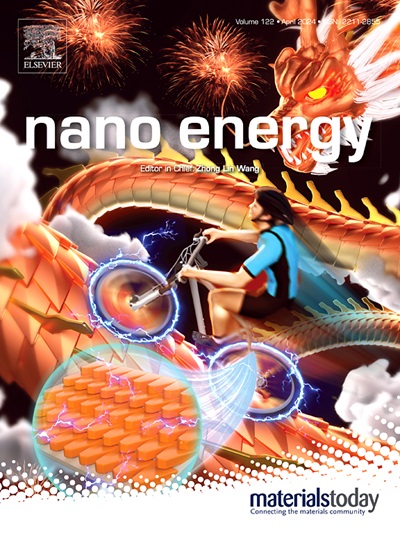Tribo-electrostatic-based high precision and interchangeable dynamic torque sensing by linear elastomer formed phase displacement
IF 16.8
1区 材料科学
Q1 CHEMISTRY, PHYSICAL
引用次数: 0
Abstract
Conventional dynamic torque sensors are limited by the measurement principle, failing to balance cost and accuracy. Herein, a phase-difference dynamic torque sensing approach based on tribo-electrostatic induction and linear elastomer is proposed and discussed. Specifically, linear elastomers with low shear modulus are synthesized and analyzed as torque-sensitive materials. Then, equipped with triboelectric sensors on both sides, a platform is constructed to validate linearity between phase difference in output signal and applied torque, increasing its precision and cost-effectiveness. Additionally, a detachable design incorporating a replaceable flexible linear elastomer enables the applicability of multiple measurement tasks. With comparable accuracy (0.001 N * m) and only 5 % of the price share when coaxially tested with a commercially available transducer, the Tribo-electrostatic-based Dynamic Torque Sensor (TDTS) offers a viable solution for structure loss and sensing analysis in micro-torque intervals, catering to the evolving demands of the IoT era with a greater focus on environmental sustainability.

基于摩擦静电的高精度、可互换的线性弹性体相位移动态扭矩传感
传统的动态扭矩传感器受测量原理的限制,无法平衡成本和精度。本文提出并讨论了一种基于摩擦静电感应和线性弹性体的相位差动态扭矩传感方法。具体而言,合成了低剪切模量的线性弹性体,并将其作为扭矩敏感材料进行了分析。然后,在两侧安装摩擦电传感器,构建一个平台来验证输出信号的相位差与施加的扭矩之间的线性关系,从而提高其精度和成本效益。此外,可拆卸的设计包含可更换的柔性线性弹性体,可适用于多种测量任务。tripo -静电动态扭矩传感器(TDTS)具有相当的精度(0.001 N*m),在与市售传感器同轴测试时仅占价格份额的5%,为微扭矩区间的结构损失和传感分析提供了可行的解决方案,满足了物联网时代不断发展的需求,更加注重环境可持续性。
本文章由计算机程序翻译,如有差异,请以英文原文为准。
求助全文
约1分钟内获得全文
求助全文
来源期刊

Nano Energy
CHEMISTRY, PHYSICAL-NANOSCIENCE & NANOTECHNOLOGY
CiteScore
30.30
自引率
7.40%
发文量
1207
审稿时长
23 days
期刊介绍:
Nano Energy is a multidisciplinary, rapid-publication forum of original peer-reviewed contributions on the science and engineering of nanomaterials and nanodevices used in all forms of energy harvesting, conversion, storage, utilization and policy. Through its mixture of articles, reviews, communications, research news, and information on key developments, Nano Energy provides a comprehensive coverage of this exciting and dynamic field which joins nanoscience and nanotechnology with energy science. The journal is relevant to all those who are interested in nanomaterials solutions to the energy problem.
Nano Energy publishes original experimental and theoretical research on all aspects of energy-related research which utilizes nanomaterials and nanotechnology. Manuscripts of four types are considered: review articles which inform readers of the latest research and advances in energy science; rapid communications which feature exciting research breakthroughs in the field; full-length articles which report comprehensive research developments; and news and opinions which comment on topical issues or express views on the developments in related fields.
 求助内容:
求助内容: 应助结果提醒方式:
应助结果提醒方式:


